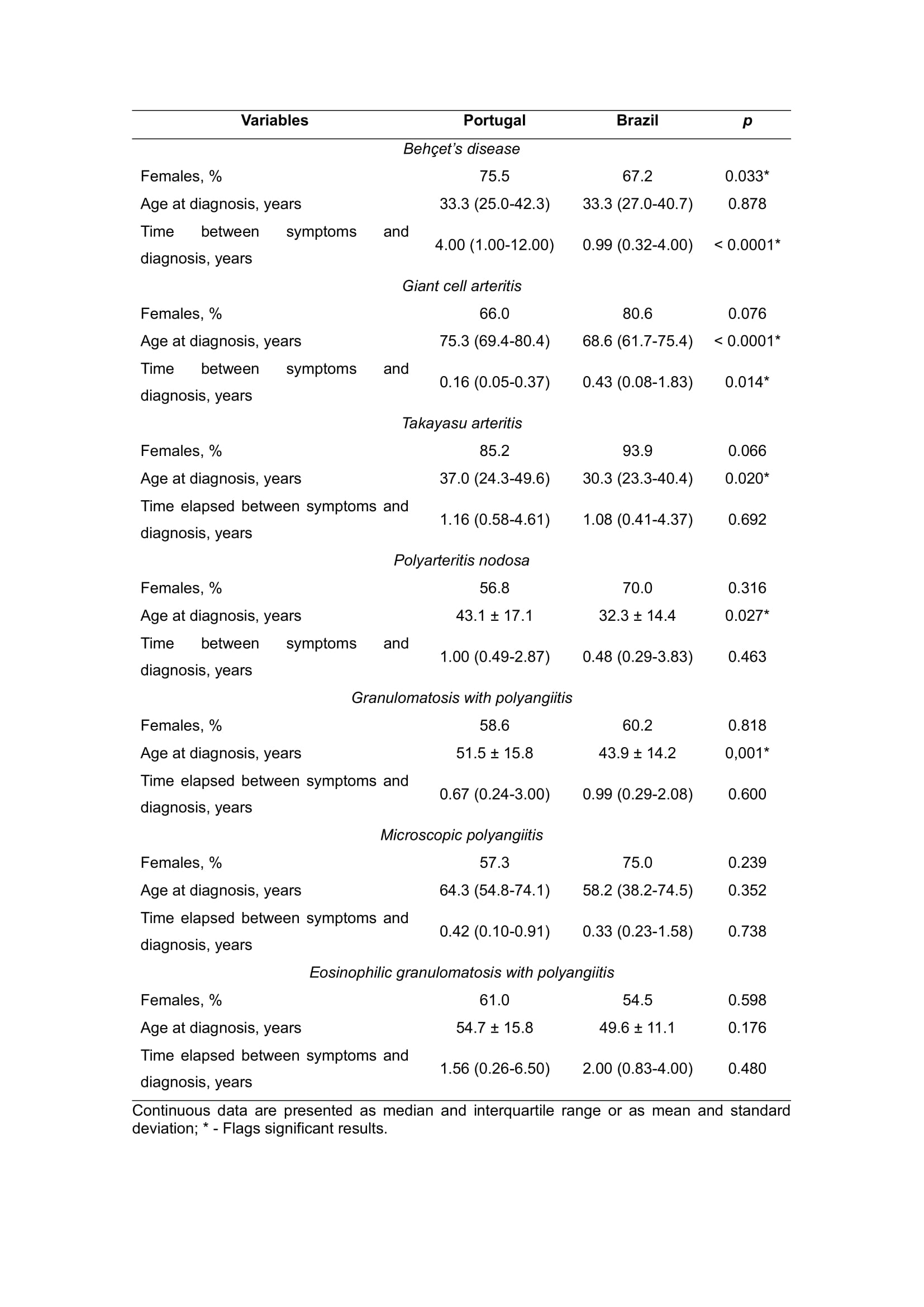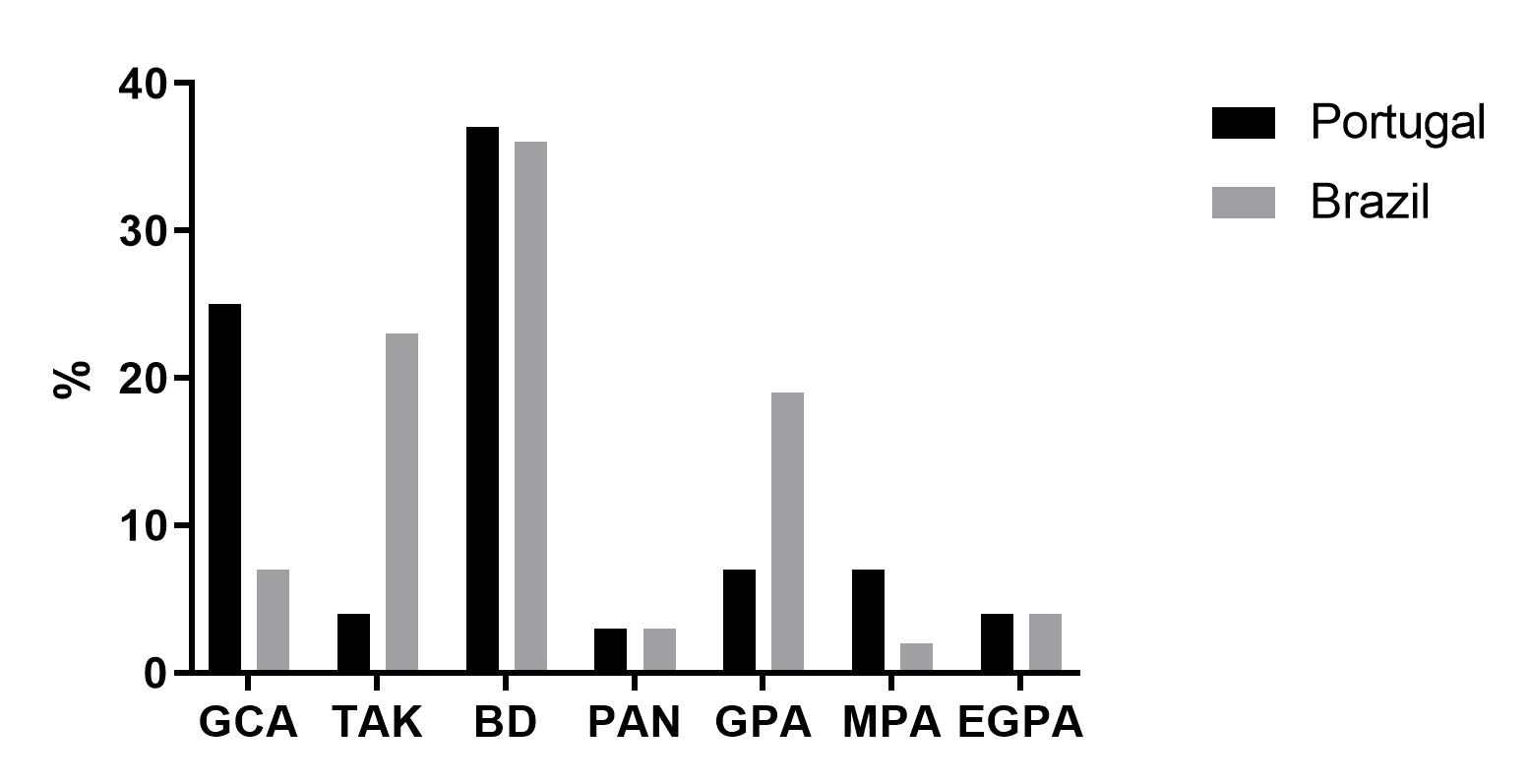Session Information
Session Type: Poster Session A
Session Time: 9:00AM-11:00AM
Background/Purpose: The epidemiology of vasculitis varies widely across different geographic areas of the world which may be due to different ethnic and environmental factors. Brazil has a heterogeneous population with influences from Indigenous, African, Asian, and European countries, while Portugal has a very ethnically homogeneous background. This study aims to assess the main differences in the profile of systemic vasculitides between Portugal and Brazil.
Methods: Collaborative project between the Portuguese and the Brazilian Societies of Rheumatology in which centres from both countries were invited to register data in the vasculitis module of the Rheumatic Diseases Portuguese Register, Reuma.pt/vasculitis. A cross-sectional analysis was performed comparing demographic, ethnic and diagnostic information between Brazilian and Portuguese centres.
Results: A total of 1,955 patients were analysed: 74.2% from 30 Portuguese centres and 25.8% from 7 Brazilian centres. Portuguese patients were predominantly European White (89.2%) and in Brazil the most common ethnic groups with vasculitis were the non-European White (48.3%) and Mestizos (40.1%); 5.4% of all participants were born in other countries. Brazilian patients were younger at the onset of symptoms [35.2 (24.1-46.6) vs.48.1 (27.4-70.1) years; p< 0.05]and diagnosis of vasculitis [37.0 (27.6-48.3) vs. 50.8 (32.7-70.4) years; p< 0.05] than Portuguese patients, respectively. When analysing individual forms of vasculitis, Brazilian patients with giant cell arteritis (GCA), Takayasu arteritis (TAK), polyarteritis nodosa (PAN) and granulomatosis with polyangiitis (GPA) were significantly younger than Portuguese patients at diagnosis (p< 0.05). The proportion of females was higher in Portuguese patients with Behçet’s disease (BD) than in Brazilian patients (p=0.03). No differences regarding the proportion of females were observed for other vasculitides (Table 1). The most common form of vasculitis in both countries was BD followed by GCA in Portugal and by TAK in Brazil. Regarding ANCA-associated vasculitis, GPA was more common in Brazil and microscopic polyangiitis (MPA) in Portugal. Both countries had similar proportions of patients with PAN and eosinophilic granulomatosis with polyangiitis (EGPA) (Figure 1 and Table 2). Time elapsed between the onset of symptoms and the diagnosis of GCA was higher in Brazil than in Portugal (p=0.014) while Portugal had a longer interval between the onset of BD symptoms and its diagnosis compared to Brazil (p< 0.05) (Table 1).
Conclusion: In this large multicentre binational study, Portugal and Brazil had a different profile of systemic vasculitis concerning the proportion of GCA and TAK patients, as well as GPA and MPA patients. In addition, both countries had differences in the age of onset, female gender, and ethnicity of patients with systemic vasculitis.
References
Ponte C, et al. Orphanet J Rare Dis, 2020.
Watts RA, et al. Nat Rev Rheumatol, 2022.
To cite this abstract in AMA style:
de Aguiar M, Silva de Souza A, Martinho J, Carones A, Bacchiega de Freitas A, Duarte A, Águeda A, Souto Oliveira Elias C, Cortesão C, Soares C, Macieira C, Garcez Teixeira C, Peixoto D, Vinha D, Nogueira E, Simil F, Guimarães F, Rajão Martins F, Ferreira G, Assunção H, Rulff H, Pestana Lopes J, Costa J, Medeiros J, Santos Porto L, Adsuara L, Ochtrop M, Gonçalves M, Diz Lopes M, Vieira M, Khmelinskii N, Torres R, Neaime S, Teixeira V, Sachetto Z, Ponte C. Systemic Vasculitides in Portugal and Brazil: Preliminary Results from the Reuma.pt/vasculitis Registry [abstract]. Arthritis Rheumatol. 2023; 75 (suppl 9). https://acrabstracts.org/abstract/systemic-vasculitides-in-portugal-and-brazil-preliminary-results-from-the-reuma-pt-vasculitis-registry/. Accessed .« Back to ACR Convergence 2023
ACR Meeting Abstracts - https://acrabstracts.org/abstract/systemic-vasculitides-in-portugal-and-brazil-preliminary-results-from-the-reuma-pt-vasculitis-registry/



